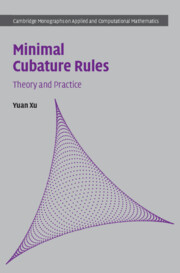Book contents
- Frontmatter
- Dedication
- Contents
- Preface
- 1 Quadrature Rules and Orthogonal Polynomials
- 2 Cubature Rules: Basics
- 3 Orthogonal Polynomials of Several Variables
- 4 Gauss Cubature Rules
- 5 Lower Bounds for the Number of Nodes
- 6 First Minimal Cubature Rules
- 7 Further Minimal Cubature Rules
- 8 Discrete Fourier Transform and Cubature Rules
- 9 Cubature Rules and Polynomial Ideals
- 10 Epilogue: Two Open Problems
- 11 Addendum: Cubature Rules on the Triangle and Simplex
- References
- Index
11 - Addendum: Cubature Rules on the Triangle and Simplex
Published online by Cambridge University Press: 10 October 2025
- Frontmatter
- Dedication
- Contents
- Preface
- 1 Quadrature Rules and Orthogonal Polynomials
- 2 Cubature Rules: Basics
- 3 Orthogonal Polynomials of Several Variables
- 4 Gauss Cubature Rules
- 5 Lower Bounds for the Number of Nodes
- 6 First Minimal Cubature Rules
- 7 Further Minimal Cubature Rules
- 8 Discrete Fourier Transform and Cubature Rules
- 9 Cubature Rules and Polynomial Ideals
- 10 Epilogue: Two Open Problems
- 11 Addendum: Cubature Rules on the Triangle and Simplex
- References
- Index
Summary
Cubature rules on triangles and simplexes are of special interest for the finite element method (FEM) and hp-FEM, which often employ triangulation of the domain. They also serve as a good specimen for constructing cubature rules on regular domains. However, due to difficulties in solving nonlinear systems of equations, it is often more practical to consider invariant cubature rules under the symmetric group for triangles and even more so for simplexes, as this approach can significantly reduce the size of the system, although the invariant cubature rules require more nodes. In this addendum, we discuss the structure of invariant cubature rules for integrals on triangles and simplexes.
Information
- Type
- Chapter
- Information
- Minimal Cubature RulesTheory and Practice, pp. 229 - 247Publisher: Cambridge University PressPrint publication year: 2025
Accessibility standard: WCAG 2.2 A
Why this information is here
This section outlines the accessibility features of this content - including support for screen readers, full keyboard navigation and high-contrast display options. This may not be relevant for you.Accessibility Information
Content Navigation
Allows you to navigate directly to chapters, sections, or non‐text items through a linked table of contents, reducing the need for extensive scrolling.
Provides an interactive index, letting you go straight to where a term or subject appears in the text without manual searching.
Reading Order & Textual Equivalents
You will encounter all content (including footnotes, captions, etc.) in a clear, sequential flow, making it easier to follow with assistive tools like screen readers.
You get concise descriptions (for images, charts, or media clips), ensuring you do not miss crucial information when visual or audio elements are not accessible.
